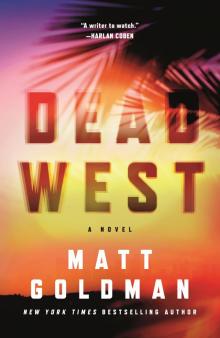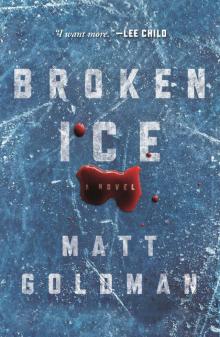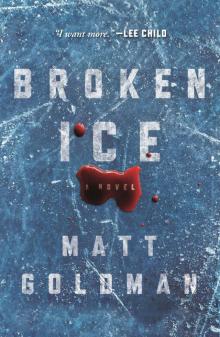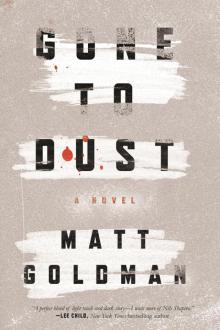- Home
- Matt Goldman
The Shallows--A Nils Shapiro Novel Page 2
The Shallows--A Nils Shapiro Novel Read online
Page 2
“How long were you married?”
“Ten years. Second marriage for both of us. Todd has kids from his first. I don’t. Never wanted them. He’s—he was nine years older than me. And when we met—”
“Are you from here?”
She shook her head. “Montreal. We met at a wedding in Toronto about a year after I got divorced. We had a weekend fling and I figured that was the end of it. But then we found excuses to rendezvous in New York or Boston on weekends. Then I started coming here. We went to Vegas once. Don’t need to do that again. Then we spent a week at Ventana in Big Sur. Have you been there?”
“No. Never been to California.”
“Northern California is the most beautiful place on the continent. You should go sometime.”
“I’ll add it to my list.”
“Anyway, we were walking in the little town of Carmel and Todd just proposed to me out of the blue. We’d only known each other six months but getting married somehow seemed like a good idea. At least at the time it did. So, we popped into a jewelry store and picked out rings and got married a few months later here in Minneapolis.”
“Are you a U.S. citizen?”
“As of last year, I am.”
“Welcome to our humble country. You getting close to telling me why you hired me rather than just letting the police do their jobs?”
She pushed her short dark hair behind her ears, which were small and brown and bejeweled with diamonds. “Todd and I fought, mostly about his various causes.”
“What kind of causes?”
“Political. I’m sure we would have already split, but it didn’t look good in his circle. Especially to some of his clients. He was riding out the marriage for appearance’s sake, but I’d made it clear I was done.”
“How did he react to that?”
“He didn’t, really. He just kind of ignored me. Said we could talk about it more toward the end of the year. I asked why the wait and he said there was no reason not to. I pressed him for a date and he said no sooner than mid-November.”
“When did he say that?”
“A month and a half ago, maybe two.”
“If you wanted out, why didn’t you just leave?”
“My first divorce was ugly. I couldn’t take another one like that, so if I could make it amicable by waiting a few months, I’d wait a few months.”
I knew how she felt. People ask if I’d ever get married again. My answer is absolutely, but I never want to get divorced again.
Robin said, “So Todd and I cohabited as roommates. It was friendly. There was nothing to fight about. It’s not like we could fix things. I just had to be patient until he was ready.”
“Did he say he wanted to fix things?”
“No.”
“But you noticed when he didn’t come to bed last night.”
“Yes. Neither of us moved into the guest room. Like I said, we were like roommates. We slept in the same bed, but we hadn’t had sex in over a year.”
“Did either of you have plans to move out?”
“It hadn’t got to that point yet. Plus, that’s the problem when you have a nice house. No one wants to leave. But I’d started to look around for either a little cottage in this area or an apartment downtown.”
“Were either of you involved with anyone else?”
Robin Rabinowitz leaned back into the cushions and stared at the porch’s tongue-and-groove ceiling. Her neck was brown and lined with forty or so years of life. There is no shortage of beautiful women in this world. It’s exhausting. Robin said, “I don’t know about Todd, but I met someone.”
“Does your new friend keep his fish or catch and release?”
She gave me a that wasn’t funny look even though she then said, “His name is Arndt Kjellgren. He’s an artist. He doesn’t fish. He’s vegan. He won’t even wear wool.”
“The Arndt Kjellgren who makes the big moving sculptures?”
“How many Arndt Kjellgrens do you think there are?”
“Fair point. Did Todd know about the affair?”
“I don’t think so. But I want to be upfront about it. You and the police need to know so you can clear Arndt and me and focus on whoever did this.”
I stood and looked down at the lake. A loon cried its echoey low whistle. I spotted the Minnesota state bird in the middle of the lake. I said, “Sometimes when a person vomits information, they’re trying to throw me off track. It can be an effective tactic with the police because their bureaucracy dictates they follow up on most leads. But I have no bureaucracy. So, I suggest you get to the point before I send your five grand back.”
Robin looked down at the team working near the dock and said more loudly than she needed to, “Let me show you where the bathroom is.”
Smart woman. I followed her into the house.
3
We entered the living room. Robin shut the door to the porch then said, “Someone connected to Todd’s law firm did this. I’m sure of it.”
I looked around the room. A coffee table made of frosted glass was full of coffee table books about fashion. Kate Moss and Tom Ford and Coco Chanel. Two tribal masks sat on opposite ends of the fireplace mantel, a ceramic urn between them. Looked like the Rabinowitzes had visited Africa or Pier 1 Imports. The overall motif was modern with a few antiques mixed in. A fuchsia chair that looked like a potato chip. An eighteenth-century armoire. A chunk of once-molten glass that looked like a giant ice cube hanging from a wire. A collection of teacups purchased at Queen Victoria’s garage sale.
I said, “All right…”
“These lawyers grew up together or went to camp together or college. One of the senior partners is a woman and they sprinkled in a few more to appear current, but trust me, they’re not. They’re tight-knit and cliquey. Todd worked at the firm when I married him. They never accepted me. I stopped going to their parties and weekend ski trips because, honestly, they creeped me out.” Robin finally looked like she might cry. Her eyes got big and wet then flashed with fear. She shut them and took a few deep breaths. “I don’t know why one of them killed Todd, or if all of them did, if Todd stepped out of line or what.” She opened her eyes and swung them toward me. “But I’m sure his murder is connected to the firm.”
I let that hang, trying to determine if her fear was real or manufactured or misappropriated. Then I said, “That’s quite an accusation.”
“Go meet them. You’ll see.”
“Did Todd seem upset about work lately?”
Robin shook her head. “No. That’s the weird thing. Everything seemed fine. He spent all his time with them.”
“Are you sure that’s what he was doing? Because ‘honey I have to work late’ has been around since some company invented the wheel.”
She sighed contempt. “I can’t prove it was always work related. But I’m telling you, the lawyers at Halferin Silver were Todd’s real family. I hate those people. Every one of them.”
The doorbell rang. Robin excused herself and walked toward the front of the house. I turned around and noticed a metal kinetic sculpture in the far corner. It featured squares and triangles painted black and white like a giant mobile for a newborn. Maybe it was a Stillman, but it could have been one of Arndt Kjellgren’s creations. I’d seen them around town. At the Walker Art Center Sculpture Garden, on Minneapolis’s Nicollet Mall, on sprawling corporate campuses, and in wealthy people’s yards and houses. The moving parts probably moved in the wind but sat motionless in the air-conditioning. If it was a Kjellgren sculpture, featuring it in her husband’s living room was one hell of a bold move for Robin Rabinowitz.
She returned and said, “Nils Shapiro, I’d like you to meet my attorney, Nellie Chang.” Nellie Chang was gymnast petite, had long black hair, sleep in her eyes, and was ethnically Chinese. I liked her for no other reason than she had a culturally mashed-up name like mine. We’d probably shared similarly confounded looks and had been on the receiving end of similarly terrible jokes.
I shook Ne
llie’s hand. She had a firm grip for a slight person. She spoke softly and somberly out of respect for Robin’s dead husband. “Hello, Nils. Nice to meet you. I’m shocked. I don’t know what to say. People in this neighborhood don’t get murdered.”
“The police will take Robin in for formal questioning. Are you a criminal defense attorney?”
Nellie said, “Yes. Four years as a Hennepin County public defender and the last ten at Swenson, Nelson, Lindquist, Lundquist, and Carlson. Do you know the firm?”
“Sounds like the starting line of the Gopher hockey team.”
“Oh, yeah.” She laughed. “It does.” But she stopped laughing when she remembered why she’d come over at 5:00 A.M. She composed herself then said, “We’re a good firm. Represent a lot of big clients. I can’t say who, of course, but they’re big.”
Robin looked to me for approval, as if she’d brought me on to manage the whole operation. Everyone seemed to be capitulating to me, and I didn’t care for it. I said, “Nellie, maybe you should go introduce yourself to Detectives Irving and Norton. Let them know you’re here and that you expect everything to be by the book.”
Nellie said, “I was just thinking the same thing.” She left and walked down to the lake.
Robin said, “So you think she’s good?”
“I have no idea.”
“Thanks a lot.”
“I’m having a hard time figuring you out. One minute you’re all business. The next you’re sad. The next you’re scared.”
“Yeah. I’m all of those. Who wouldn’t be?” Her big wet eyes returned, but I couldn’t tell if Robin was afraid Todd’s fate would be her fate or if she was afraid of something else. Like what she’s capable of. Maybe that scared the hell out of her. Robin’s intentions were as hazy as the stagnant August air.
I said, “I get that you’re afraid, and I know your marriage to Todd was ending, but I’m seeing no reaction to you finding him tied to the dock by a stringer through his jaw while fish nibble off his face.”
“Holy shit. Give me a fucking break!” She seemed startled by her outburst, shut her eyes and rubbed her forehead. These are the moments when a decent detective keeps his mouth shut to prolong the awkward pauses that abhor a vacuum. Robin looked at me, hoping I’d fill it. When I didn’t she grew calm with resignation and said, “I need you to find out who did this because they might do it to me and because I know the police will suspect I killed my husband or had him killed.”
“Did you?”
“Yes. I’m an experienced murderer who’s grown bored outsmarting the police so I hired the best private detective in town to make getting away with it more of a challenge.”
Her face was twisted up with so much sarcasm I began to like her. I gestured for Robin to follow me. She looked annoyed but did. I needed a moment to think. Robin Rabinowitz was about to split with dead Todd. She told me and she’d tell the police. Then they’d look hard at her for Todd’s murder and would stop cooperating with me if they perceived me as making their job more difficult. I led Robin into the kitchen. It had glossy white European-style cabinets that opened from the bottom like garage doors and black synthetic stone countertops. Stainless steel appliances gave the room all the color of a dead fish. How appropriate.
I said, “I’ll take this job, but we’re going to tell the police I’m not.”
“What?”
“I’ll make it look like I won’t work for you because I think you killed your husband.”
“Are you out of your fucking mind?”
“You don’t have to hire me.”
Robin leaned against the kitchen island. She thought for a minute. Maybe two. I was about to walk away when she said, “Molly mentioned you can be a pain.”
“I thought she said I was nice.”
“She said you were nice and sometimes a pain.”
“That hurts my feelings.” She glanced up at me. She was not amused. I said, “Here are the rules: no electronic communication. I’ll contact you via snail mail with sympathy cards. You can write me back at the return address. The five grand will cover my rate and expenses. Until it runs out. I’ll let you know when that is. Assume your emails, texts, and phone calls are being monitored. Assume you’re being followed. Don’t meet your boyfriend until further notice.”
“I don’t like these rules.”
“You have two choices. I can not work for you or work for you and tell people I’m not. Your decision. And you need to make it right now.”
She stared at me, ran her fingers through her dark hair, then said, “All right. We’ll do it your way.”
“Good. You look like a quick study. Follow me. And act surprised when I quit.” I walked out of the kitchen, through the living room, into the screened-in porch, and exited to the backyard. I continued down the lawn and saw Nellie Chang kneeling on the dock and puking into the water. It was a goddamn smorgasbord for the fish that morning in Christmas Lake.
I entered the white tent. The Hennepin County medical examiner was sixty-something and six feet four or so and that was standing stoop-shouldered. He wore tiny round rimless eyeglasses and was bald on top but had allowed the white-gray hair on the sides of his head to grow. He had pulled it back into a four-inch ponytail. Normally, I’d look for a scissors to snip it off, but when a person reaches sixty, I forgive them certain transgressions.
Dr. Melzer had kind gray eyes and a capillary-ridden nose. He wore a white smock and green latex gloves and examined Todd Rabinowitz’s fingernails. Detectives Norton and Irving stood queasy and quiet and pasty, and a CSU photographer snapped photos as if a model were walking down a runway. The M.E. said, “Hello. I’m Dr. Melzer. You must be the P.I.” He smiled and looked up from the body, which lay on a stainless-steel table. The red stringer still ran through Todd Rabinowitz’s lower jaw, and his lidless eyes stared at the tent ceiling.
I said, “Nils Shapiro. Nice to meet you, Dr. Melzer. Anything yet?”
Melzer glanced at Detectives Irving and Norton. “You boys okay with me sharing?”
“Please,” said Norton.
“Our friend here has water in his lungs. I won’t know if it’s lake water until I get him back to the shop. But assuming it is and he drowned and died in Christmas Lake, and factoring in lake temp, air temp, and body temp, I’d say he died around one A.M. I do know he was still alive when the stringer spike was shoved through his jaw. Must have been unpleasant. The fish have had at him pretty good. Especially the eyelids. Not uncommon. My theory is the eyelashes resemble something the fish like. That draws ’em in and the little buggers take it from there.”
“Legs.”
“What?”
“The eyelashes look like insect legs. Of mayflies about to hatch or stoneflies about to crawl out of the water.”
“No kidding?” said Dr. Melzer. “You some kind of amateur entomologist?”
“Fly-fisherman.”
“Ah. Loved A River Runs Through It. Ever see that movie?”
Robin said from outside the tent, “Excuse me, Nils?”
Detective Irving said, “Uh, Mrs. Rabinowitz, you probably shouldn’t come in here.”
“Okay. Um. Is Nils Shapiro in there?” I walked outside but stayed close to the tent. “There you are,” she said. “I just saw that you declined my five thousand dollars. What’s that about?”
“I can’t work for you.”
“Why not?”
“I’d rather not say.”
“You’d better say. I hear you’re the best and there’s no point hiring anyone else. I need someone to help the police find Todd’s killer.”
That last line sounded a little clunky. I’d hoped she’d do better. I said, “I think it’s best if I leave.”
“No! I’m willing to pay good money! However much you want! I need to know why you won’t take the case!”
The inside of the tent had gone silent. I paused for dramatic effect. I felt the cold seep of morning dew as it breeched my Rod Lavers.
“All right,�
�� I said in a hushed but audible tone. “I made a few calls, Mrs. Rabinowitz. Woke some people up. Apparently, you haven’t been forthcoming with me.”
“About what?”
“About you and Todd. About you and a man named Arndt Kjellgren.”
“I don’t know what you’re talking about.”
“I think you do. My sources tell the truth.” That line was a bit clunky, too. I blamed my early wake-up call.
Robin lowered her voice. “You think I killed him?”
“Probably not personally. I can’t picture you pushing that stringer spike under his tongue and out the bottom of his jaw. But you had all the reason in the world to have someone else do it.”
“If that’s true, why would I be trying to hire you?”
“Appearance? Hubris? You tell me.”
“I can’t believe this.”
“Good-bye, Mrs. Rabinowitz. And good luck. You’re going to need it.” I walked up the dewy lawn, my soaked socks squeaking in my shoes. God, I hate summer.
4
I got into my still-new-smelling Volvo. The hockey-mom-mobile had two years left on its lease. Ellegaard insisted I get it, saying the car made a more favorable impression than my old, beat-up Volvo, but I looked forward to turning the car in and replacing it with something less maternal. Too many envious looks came my way from people pushing baby carriages.
Stop-and-go rush-hour traffic clogged Highway 7 heading back into the city. I didn’t mind the thinking time and when I was done thinking called Annika Brydolf, Stone Arch Investigations’s junior investigator. I asked if she could meet me at eight. She requested closer to eight thirty because she had to drop her kids at day camp.
I pulled into my loading dock because I lived in a former coat factory that still looked like a coat factory except the manufacturing equipment was gone and my crappy furniture was there. The owner of the building had finally acquired permits to renovate my home into retail space with condos above. I had an option to buy one of the condos but the price tag was well out of my range. I’d have to move by October 1.

 The Shallows--A Nils Shapiro Novel
The Shallows--A Nils Shapiro Novel Dead West
Dead West Broken Ice
Broken Ice Broken Ice--A Novel
Broken Ice--A Novel Gone to Dust
Gone to Dust